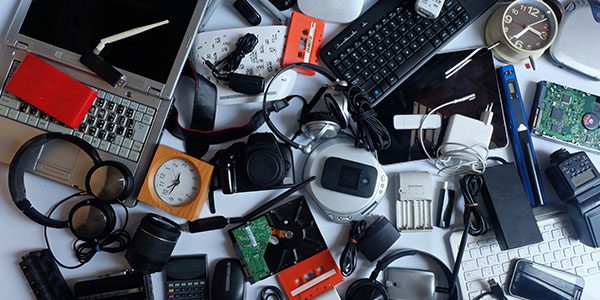Elevate Your E-Waste Monitoring With R2 Accreditation: a Comprehensive Review
One secret technique to boost e-waste administration practices is by attaining R2 qualification. By discovering the benefits and procedures linked with R2 certification, a deeper understanding of how it can transform e-waste administration strategies emerges, losing light on a course in the direction of sustainability and honest disposal techniques.
Importance of E-Waste Monitoring

When e-waste is not handled correctly, these poisonous materials can leak right into the ecological community, triggering injury to wild animals and possibly going into the food chain, posturing risks to human health. Additionally, the incorrect disposal of e-waste adds to pollution and greenhouse gas discharges, worsening climate change and ecological deterioration.

Advantages of R2 Qualification

To start with, R2 accreditation improves trustworthiness by showcasing an organization's dedication to sustainable techniques. It guarantees consumers, companions, and stakeholders that the firm follows stringent standards for e-waste management - r2 certification. This reputation can lead to enhanced count on and improved connections with customers who prioritize environmental obligation
Second of all, R2 accreditation helps reduce threats connected with inappropriate e-waste disposal. By following the strict guidelines established forth by the qualification, organizations can decrease the probability of information violations, ecological contamination, and lawful repercussions. This positive technique safeguards the firm's track record and lessens possible liabilities.
Finally, R2 certification shows a dedication to environmental stewardship - r2 certification. By sensibly managing electronic waste via certified processes, companies contribute to the preservation of sources, decrease of air pollution, and promotion of a circular economic climate. This dedication not only benefits the environment but also lines up with evolving consumer assumptions for sustainable business practices
R2 Accreditation Process Review
Having developed the advantages of R2 qualification in promoting trustworthiness, threat mitigation, and ecological stewardship, it is essential to now describe the detailed process associated with acquiring this qualification. The R2 qualification process starts with an extensive evaluation of the company's operational policies and procedures to ensure compliance with the R2 standard. This first evaluation is critical in recognizing any kind of gaps that need to be attended to prior to proceeding better.
As soon as the company's methods line up with the R2 typical needs, an independent third-party auditor carries out an on-site audit to evaluate the implementation and efficiency of these methods. This audit consists of a detailed testimonial of documentation, interviews with team, and physical assessments of facilities to validate compliance.
Adhering to a successful audit, the organization gets an accreditation choice based on the auditor's searchings for. If authorized, the company is approved R2 accreditation, demonstrating its dedication to accountable e-waste administration. It is important to keep in mind that keeping R2 accreditation requires recurring conformity with the requirement's demands and routine audits to ensure ongoing adherence to best methods in e-waste recycling and disposal.
Trick Standards for R2 Conformity
An essential facet of achieving R2 conformity is guaranteeing that all digital waste (e-waste) processing centers meet rigorous ecological and security requirements. To follow R2 demands, companies need to abide by visit the site essential requirements that focus on liable e-waste monitoring techniques. These standards include carrying out a documented environmental, wellness, and security management system, making certain the safe handling of data-containing gadgets, and performing complete downstream due diligence to track the final location of e-waste products.
Furthermore, R2 compliance requires the appropriate testing, repair, and recycling of electronic equipment to extend its helpful life and lessen ecological effect. Facilities looking for R2 certification must additionally focus on worker health and wellness and safety by giving required training, personal safety equipment, and a safe workplace. In addition, maintaining in-depth records of e-waste handling activities and on a regular basis going through audits by accredited certifying bodies are vital elements of demonstrating ongoing conformity with R2 requirements.
Effects of Lasting E-Waste Practices
The application of lasting e-waste practices according to R2 conformity not only ensures ecological and safety and security standards are met but also significantly impacts the overall lifecycle of electronic items. By adhering to R2 requirements, electronic waste monitoring procedures end up being a lot more reliable, decreasing the environmental impact of electronic items. Lasting e-waste techniques facilitate the appropriate disposal of digital components, making sure that hazardous products are taken care of responsibly and do not end up polluting the atmosphere.
Moreover, embracing sustainable e-waste methods advertises the circular economic climate by assisting in the recovery and reuse of useful you can try this out materials from digital items. This not just saves priceless sources yet likewise decreases the demand for resources removal, decreasing the environmental impact of electronic production. Furthermore, sustainable e-waste practices can add to work creation in the recycling and refurbishment sectors, fostering economic development while promoting ecological duty. On the whole, the fostering of sustainable e-waste techniques under R2 certification offers as a crucial step towards achieving a more eco lasting electronic devices industry.
Conclusion
Finally, applying appropriate e-waste monitoring methods is essential for environmental sustainability and resource preservation. R2 accreditation plays an essential role in making certain responsible handling and disposal of electronic waste. By sticking to the rigorous requirements established forth by R2 standards, companies can not just lessen their environmental effect however likewise add to an extra lasting future for generations to find.
One secret method to raise e-waste management methods is by achieving R2 qualification. By exploring the advantages and procedures connected with R2 accreditation, a much deeper understanding of exactly how it can revolutionize e-waste management methods arises, losing light on a path towards sustainability and moral disposal techniques.
The R2 certification procedure begins with an extensive testimonial of the company's functional policies and treatments to make sure compliance with the R2 criterion. If authorized, the company is given R2 qualification, showing its commitment to responsible e-waste administration. In general, the fostering of lasting e-waste methods under R2 accreditation offers as a vital step in the direction of Resources achieving a much more eco sustainable electronics industry.